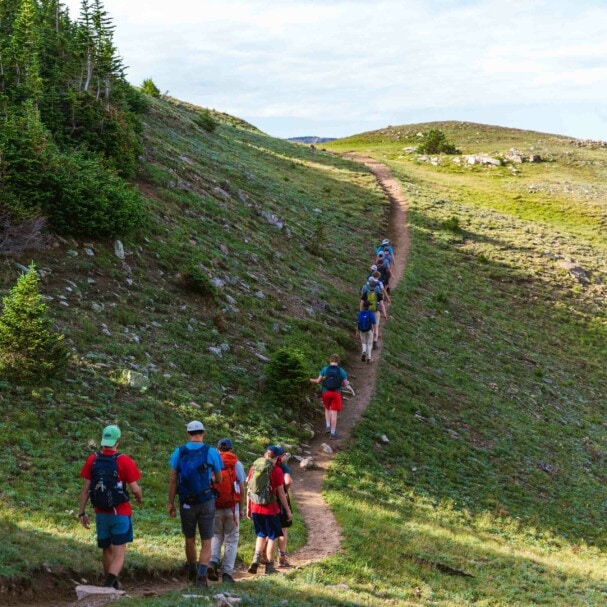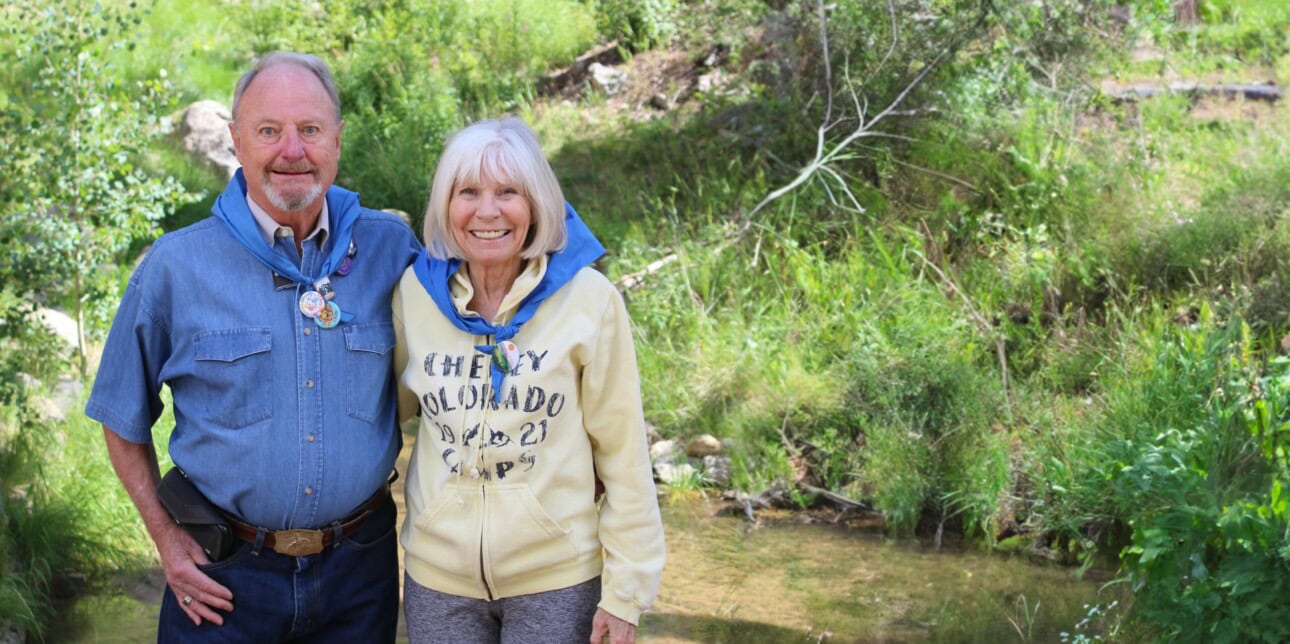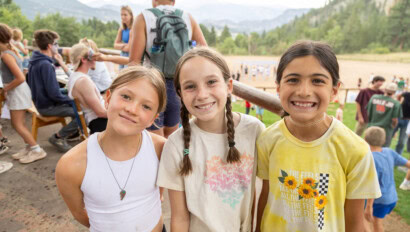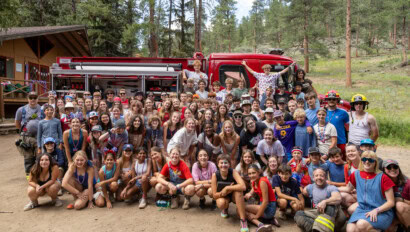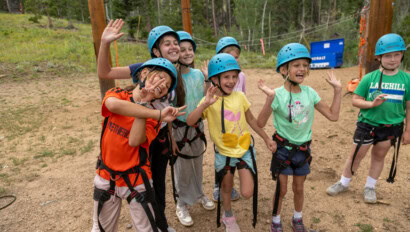As we celebrate the holiday season, we’re reminded of the enduring influence of Don and Carole Cheley, whose love and dedication continue to shape Cheley’s spirit, even in retirement. Originally posted in the summer of 2021, this conversation with Don and Carole highlights their 78-year connection to camp—an era of leadership, vision, and passion that has left an indelible mark on the heart of Cheley.
Though Don and Carole are now retired, they remain a central part of our community, offering their expertise, wisdom, and care to Cheley and the broader camping world. While their role as directors has passed to the next generation, Don and Carole’s legacy continues to inspire us all. We hope you enjoy this special reflection on their journey as we celebrate the holidays and look forward to the future of camp.
Third-generation directors Don and Carole Cheley sit on the back deck of Brookside, their summer home nestled in the heart of Boys’ Camp. Looking out towards the Mummy Range, the Cheleys spent the morning talking with me about their life—as camp directors, parents, partners, and now retired (but not really) folks.
For more than 74 years, Don Cheley grew up surrounded by the red-roofed buildings that cover Cheley’s Land O’Peaks property. At age eight, Don’s mother started him in Lower Ski Hi, where he spent six terms in the unit. After experiencing camp at Cheley, Don spent a few summers at other camps in Michigan and North Carolina.
Moving into a counseling role, Don spent two years in Ski Hi and two years in Haiyaha. Whether as a camper or a counselor, he experienced every boys’ unit. Spending most of his life at camp, he also worked away from the family business in Food Services for American Airlines. However, as he puts it, “for all practical purposes, I’ve been here for 74 years.”
As a camper, not all the programs offered today were available to him. Taking tech. climbing, mountain biking, rafting, SUP boarding, and high ropes out of the equation, there was riding, hiking, backpacking, and outcamping offered as out-of-camp activities. In camp, there was archery, riflery, sports, crafts, and that was about it.
As a camper, he thought he was going to be a gung-ho hiker. Going for his hiking patch, the feature hike was Flattop and Hallett—no problem for an 8-year-old…After reaching the summit of Hallett early, the counselor decided to add Mount Otis. After summiting all three peaks and coming down the glacier late and exhausted, Don rethought his hiking aspirations and started riding instead. After that, he spent most of his time as a camper on a horse.
Carole mentioned that she would have participated mostly in hiking, peppered in with some horseback riding. Throughout her time at Cheley, she’s summited many of the mountains in the surrounding areas. After completing her responsibilities back at camp, she used to jog out to meet Haiyaha on a hike, and they’d say, “how’d you catch up with us?” That’s pretty emblematic of Carole’s positive and active spirit.
When Carole and Don met, she was an elementary school counselor in Aurora Public Schools. Having worked with children and grown up with her mother running a kindergarten in her home, she was familiar with family business life as well. After tagging along with a friend to an outdoor education conference for teachers and educators, she eventually met Don, and the rest is history. She recalls how Cheley has a way of making its way into your life: “I think it finds you. You don’t find it.”
Married nine months later, Carole said that their individual skills were complementary, making them a great team. Plus, he had really pretty blue eyes.
“It was like putting on a pair of shoes that were comfy. It just seemed like a fit.”
Carole on Meeting Don
After 12 years of being directors, Don and Carole took over camp in 1981. During their time in charge, the two worked to protect what they call “the core of camp.” Cheley feels like its own little world up in the mountains, and with the impending plans for houses making their way closer to camp, Don and Carole made the decision to buy Fish Creek Ranch, just southwest of camp. In the ‘80s, when land was affordable, they added 80 more acres down the road, 160 acres at Pierson Park, and a house and 5 acres at the Girls’ Trail’s End.
Expanding upon post-season and pre-season outdoor education programs added in the ‘70s, they introduced tech. climbing and rafting trips. Modifying programs to increase capacity at camp, Carole describes it as pushing walls out and adding beds everywhere.
Looking back on their recruiting days, they recalled how much camp has changed. When they took over camp, the internet had yet to be invented. Traveling from campus to campus and city to city, Don and Carole spent many months out of the year speaking with people about camp. Their dedication to in-person recruitment was a steppingstone to employing people from all over the country and the world: “I think our honeymoon was a recruiting trip. We were on the road for a month.”
With the introduction of more technology, Cheley was one of the first camps to produce a video. They used to send out the VHS video with a bag of microwave popcorn and a return envelope. After people watched the video, they’d be asked to send it back. Carole shared, “it was what was available in the culture. You use what you have.”
Speaking with the Cheleys was like getting a glimpse into history. Another change that increased talk about Cheley was the introduction of 800 numbers. With the availability of a toll-free 800 number, it looped into the marketing aspect of recruitment. With more inquiries about camp and the introduction of the internet, things changed rapidly. Cheley was one of the first camps in the country to have its own website.
“I was out to lunch, and when I came back from lunch, everything had changed… I’m still out to lunch.”
Don on the Changing Landscape of Camp Marketing
With more people looking into camp, they knew they needed to add more programs. At the same time, the National Park was discussing how many “beating hearts” were allowed on trail. Carole mentioned that if a group was only allowed to have 12 beating hearts on trail, that meant 6 people and 6 horses, or 10 campers and 2 counselors. Knowing that programming couldn’t be done that way, they knew they needed to expand on offering alternative programs to hiking, riding, and backpacking, since those would no longer be enough. This is when many of the additional activities offered today were added.
After running a summer camp for roughly 40 years, I asked about any lessons they’ve learned along the way. As Don’s father, John Austin, used to say, “the systems will save you.”
At Cheley, everything runs on a small system. You take care of little details, plan ahead, and have a system for virtually everything—dining room, silverware, transportation, cabin inspections, unit pride. There’s a system you follow. In addition to encouraging innovation and creativity, the anchor of a system is still a critical part of camp. Breakfast is at 7:30 a.m., we ring the bells at certain times, the store is open at a certain time, and you shower at a certain time.
“There were all these things that the kids became aware of and could count on.”
Don on Systems and Success
Don is convinced that one of the keys to camp’s success was the introduction of the Code of Living. Founder Frank H. Cheley came up with the Code, a set of values that each cabin creates at the beginning of the summer and lives by throughout camp. The campers develop their own expectations—it’s not handed down on marble plaques. Campers must think, “How do I want to be in relationship to my fellow campers?” When you set the bar high, the expectations high, you’re not always going to hit them. However, if you don’t have expectations at all, you’re not setting campers up for success.
Similar to how systems keep camp running, Don and Carole spoke about the importance of their staff. With good leadership and returning staff, those systems and anchors make it easy to help campers feel secure, even if they don’t know it’s happening. Without last summer, Cheley had to recreate the stability that has worked for a century and adjust systems where needed.
In the off-season, the Cheleys continue learning about youth development and new techniques in mentoring, not just for their sake but for the world of camping. Conferences provide a lot of opportunities to get to know other camps. As Carole says, “you don’t know everything about everything. There’s so much to learn.”
Active in legislative issues, the Cheleys were outspoken when the government considered shutting down the J-1 Visa for exchange visitor programs. With their previous work, they realized there were 25,000 international summer camp workers. International workers are essential to camp because they expose campers to people from all over the world. When a Lower Ski Hi camper has a counselor from Auckland, he learns about a place different from his own and hopefully becomes curious to visit someday.
In addition to practical questions, I wanted to learn more about the Cheleys’ experience as a camp family and the special parts of their camp life.
Raising a family at camp is different. As a camper, Don remembers wanting to remain anonymous during the summer. He didn’t want to be known as the director’s son. Because the expectations are higher, you feel like you have to compete and be the perfect camper. Now, with fourth-generation Jeff and Brooke Cheley directing and their grandkids as campers and staff, Don knows how it feels, saying:
“Being a Cheley at Cheley is a hard role.”
After so many years at camp, it felt necessary to ask an important question:
What is your favorite camp meal?
D: Grilled cheese and tomato soup. BLTs. Probably the Sunday morning breakfast with granola, fruit, yogurt, and sweet rolls.
C: When we have French toast with powdered sugar and syrup!
Having seen every part of camp, I asked another important question:
What is your favorite place in camp?
D: There’s several, depending on what you’re doing. The aspen grove by the soccer field is a peaceful place. Amazing things have happened in Chapel; it’s a special spot. Not easy to get to, but the top of Cathedral. The Ranch is special because we got that and persevered with it.
C: I’ve really come to appreciate Brookside because it’s by the stream. Sometimes it can drive me crazy because it’s in the middle of everything, and bathroom doors are slamming over here, and our front door is right there, and it’s like, “We need more privacy!” But it’s actually really cozy in there. Last summer, I went down to Chapel several times and just looked out. I love the pond area when there’s fish in it. The TEs are also little pieces of heaven.
After a morning spent listening to years of history laid out before me, it makes sense why such a special place has been around for 100 years. Don and Carole’s dedication and love truly make them the Heart of Camp.
This article was originally published in Summer 2021 by Online Editor, Elise Finn.
